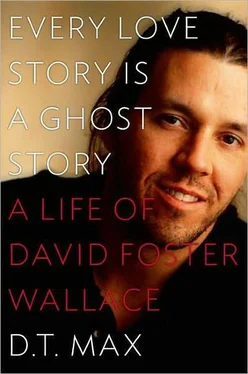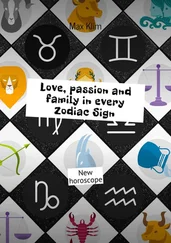I began to suffer from what I guess now was a hallucination. I thought that a huge wound, a really huge and deep wound, had opened on my face, on my cheek near my nose…. Right before graduation — or maybe a month before, maybe — it got really bad, such that when I’d pull my hand away from my face I’d see blood on my fingers, and bits of tissue and stuff, and I’d be able to smell the blood, too…. So one night when my parents were out somewhere I took a needle and some thread and tried to sew up the wound myself.
A literary sensibility is emerging too. The prose feels fraught and necessary. The writing conveys a sense that consciousness tricks and torments us, helps us build a wall to hide from who we are, yet at the same time the pleasure-giving power of words eases the despair of the story, along with a hope that love can rescue, a wispy hint that is quickly obliterated and will not appear in Wallace’s work again for many years. 8
What is most original and distinctive in “Trillaphon,” though, is the precision with which the narrator captures what it is like to be deeply depressed, his skillful evocation of a state of mind he wants us urgently to understand. One would hardly mistake this for ordinary student fiction about depression, the kind the narrator dismisses as “just sort of really intense sadness, like what you feel when your very good dog dies…and in a couple days it’s gone altogether.” Real depression, the narrator insists, is different:
To me it’s like being completely, totally, utterly sick. I will try to explain what I mean. Imagine feeling really sick to your stomach….[Now] imagine your whole body being sick like that…. Imagine that every cell in your body, every single cell in our body is as sick as that nauseated stomach. Not just your own cells, even, but the e. coli and lactobacilli too, the mitochondria, basal bodies, all sick and boiling and hot like maggots in your neck, your brain, all over, everywhere, in everything. All just sick as hell. Now imagine that every single atom in every single cell in your body is sick like that, sick, intolerably sick. And every proton and neutron in every atom…swollen and throbbing, off-color, sick, with just no chance of throwing up to relieve the feeling. Every electron is sick, here, twirling off balance and all erratic in these funhouse orbitals that are just thick and swirling with mottled yellow and purple poison gases, everything off balance and woozy.
But even this doesn’t capture the overwhelming experience of depression for the narrator. “The Bad Thing is you,” he concludes, echoing the caption under the Kafka picture he had on his bulletin board at home (the disease was life itself),
nothing else…you are the sickness yourself…. You realize all this, here. And that, I guess, is…when you look at the black hole and it’s wearing your face. That’s when the Bad Thing just absolutely eats you up, or rather when you just eat yourself up. When you kill yourself. All this business about people committing suicide when they’re “severely depressed”; we say, “Holy cow, we must do something to stop them from killing themselves!” That’s wrong. Because all these people have, you see, by this time already killed themselves, where it really counts…. When they “commit suicide,” they’re just being orderly. 9
Wallace wrote Washington a bit of doggerel to herald his return for the second semester of the 1983–84 school year:
Roses are Red.
Violets are Blue;
I am well
And hope you are too.
Wittgenstein,
Was a raving fairy;
I’ll be in Amherst
In January.
Charlie McLagan, leaving his parents’ house in suburban Chicago, picked him up in Urbana and drove him east in the family’s station wagon. They listened to Joy Division and Brian Eno as they sped along the interstate. McLagan was himself taking a year off, and Wallace stayed with him and his roommate for a week in Boston. McLagan thought Wallace seemed different now — fragile, tentative, apologizing for everything he did, whether it was playing the TV too loud or using up the soap in the shower (he washed his hair with soap, not wanting to waste his friend’s shampoo). McLagan’s roommate joked to him that Wallace seemed on the point of apologizing for using the oxygen in the air. On New Year’s Eve, the three went to a nudie bar in the Combat Zone. Wallace said he found it depressing. McLagan told him he needed to toughen up. “This is reality,” he pronounced.
When the semester started, Wallace showed his new commitment to fiction. He believed that if he was going to write better, he had to study it, just as he had philosophy. So during the next two semesters he took classes in the American novel and modern British poetry, finding himself particularly drawn to Frank Norris’s ungainly naturalist novel McTeague in the former and to T. S. Eliot’s cryptic “The Waste Land” in the latter. He took a course in literary approaches and theory and reveled in Jacques Derrida’s essays, “The Double Session” and “Plato’s Pharmacy.” Norris’s novel showed how much room there was for the bizarre in fiction, even in supposedly realist works; Eliot, whose poem has dozens of famously ambiguous endnotes, suggested a place for self-consciousness in literary creativity. (Wallace would one day say that he loved endnotes because they were “almost like having a second voice in your head.”) Derrida would be the longest-lasting influence of the three. Wallace told his professor, Andrew Parker, that he was happy to find a philosopher who cared about literature.
The biggest innovation in Wallace’s life was a class in creative writing he signed up for. For him, this was an extraordinary departure. He still did not like the literary environment at school. It seemed effeminate and sensitive and self-absorbed. And then, too, he was a young man from the Midwest, and midwestern boys might teach or read or make ironic fun of novels, but they did not go to college to learn how to write them; fiction wasn’t quite school and it wasn’t quite work. Wallace’s attitude might be summed up by a comment the narrator makes in “Planet Trillaphon” about May: “She wanted to write made-up stories for a living. I said I didn’t know that could be done.”
Amherst was similarly skeptical of creative writing. The school offered only one class, under the sponsorship of the English department. That year its teacher was Alan Lelchuk, the school’s visiting writer. The veteran novelist immediately noticed the skinny boy in the back with the backward baseball cap and strong opinions. Wallace submitted a story; Lelchuk told him the writing was shallow and tricky, “philosophy with zingers.” The young man would have, Lelchuk remembers, a clever thought and then “three wise-ass sentences around it.” Lelchuk called Wallace in to discuss it with him, expecting the student might get angry and quit the class. He told Wallace that he could be a philosopher or a writer, and if he wanted to be a writer, Lelchuk could be of use; he should take the week to think about it. To his surprise, Wallace was back the next day asking for help. Lelchuk was pleased; he thought Wallace was acknowledging how much he had to learn. But privately, Wallace was seething. He was probably Amherst’s best student and expected the respect that came with that rank. He did not like to be criticized. But then Lelchuk, a realist in the style of Philip Roth, gave a reading of a portion of his new novel, Miriam in Her Forties , and Wallace relaxed. At one point an inmate has his first meal after getting out of jail and exclaims, “A mite better than prison fare.” A new punch line was born among Wallace and his friends, as Costello remembers. Looking at the weather: “A mite rainy, no?” And on the way to Valentine: “Care to get some breakfast fare?” To Wallace, Lelchuk’s effort embodied the clumsiness of mainstream realist fiction. He thought he could do better.
Читать дальше












